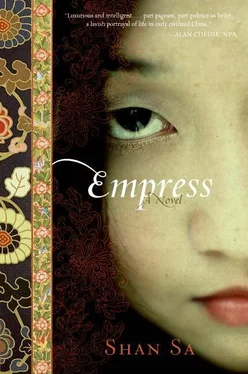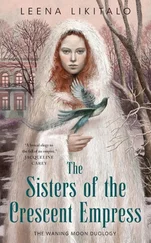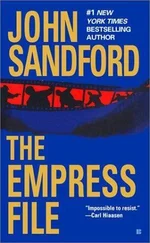Shan Sa - Empress
Здесь есть возможность читать онлайн «Shan Sa - Empress» весь текст электронной книги совершенно бесплатно (целиком полную версию без сокращений). В некоторых случаях можно слушать аудио, скачать через торрент в формате fb2 и присутствует краткое содержание. Жанр: Историческая проза, на английском языке. Описание произведения, (предисловие) а так же отзывы посетителей доступны на портале библиотеки ЛибКат.
- Название:Empress
- Автор:
- Жанр:
- Год:неизвестен
- ISBN:нет данных
- Рейтинг книги:5 / 5. Голосов: 1
-
Избранное:Добавить в избранное
- Отзывы:
-
Ваша оценка:
- 100
- 1
- 2
- 3
- 4
- 5
Empress: краткое содержание, описание и аннотация
Предлагаем к чтению аннотацию, описание, краткое содержание или предисловие (зависит от того, что написал сам автор книги «Empress»). Если вы не нашли необходимую информацию о книге — напишите в комментариях, мы постараемся отыскать её.
Empress — читать онлайн бесплатно полную книгу (весь текст) целиком
Ниже представлен текст книги, разбитый по страницам. Система сохранения места последней прочитанной страницы, позволяет с удобством читать онлайн бесплатно книгу «Empress», без необходимости каждый раз заново искать на чём Вы остановились. Поставьте закладку, и сможете в любой момент перейти на страницу, на которой закончили чтение.
Интервал:
Закладка:
I had given her an income equivalent to that of a king. I had chosen a life for her devoted to the arts and to love; I had hoped her life would be full of pure, crystalline joy to make the immortals jealous. But terrible suffering-that epidemic that ignored the crimson walls of the Palace, which invited itself into the homes of rich and poor alike and which struck down beggars just as readily as princes-had succeeded in reaching Moon in her jade cocoon.
At the age of thirteen, my daughter conceived a violent passion for Xue Shao, whom she had met while walking beside the River Luo. To fulfill her desires, I ordered the young aristocrat to repudiate his legitimate wife, and I offered them the most lavish wedding in history. But prince consorts have hearts as capricious as imperial princesses: Having been forcibly married, Xue Shao remained attached to the memory of his first wife who had chosen to commit suicide rather than be abandoned. He had treated Moon with respectful contempt. Moon was accepted and rejected, feared and loathed by her husband’s family, and she had hidden her pain from me until the day I discovered that this unworthy son-in-law was involved in a conspiracy.
Xue Shao was executed; Moon lost her failed source of happiness. I urged her to remarry, and she fell in love with my nephew Tranquility who was also a married man. The cousin, astonished by this unexpected good fortune, did not wait to be begged. He dismissed his wife and loved Moon with religious fervor. But she was haunted by the memory of Xue Shao: The imperial princess preferred an impossible love to the adoration she was offered. Very soon after they were married, she betrayed her husband in the arms of a guards officer.
I despaired at my daughter’s turbulent emotions. When she chose Tranquility, I thought the gods had showed me the path of hope: Marriages between my nephews and my children would knit together the two clans, both tributaries of the same river. But the failure of this exemplary marriage only increased hostilities.
Filial love cost me endless waiting, much disappointment, and considerable pain. I kept the succession unclear to maintain the balance: My nephews continued to live in hope, and my ministers continued to obey me, while I woke a little more tired every morning. The crown, which conferred power on me, was not enough to alter the course of the stars, the cycle of the seasons, or the hearts of men.
After his wife and his concubine had been executed and his sons had been captured, Miracle became a ghost. Moon changed her lover, and Tranquility drowned his sorrows in alcohol. My nephews pursued their fight for my favor. None of them was interested in the people, the land or the splendor of the Empire. None of them knew anything of self-abnegation and the sacrifices of being sovereign.
I envied all those who saw their lives stretching to infinity in generations to come. I searched in vain for the future of my dynasty.
TWELVE
The seasons came and went. In springtime, the skies were filled with peach rose, pear white, grenadine orange, and magnolia mauve. In the autumn, the wounded leaves of the maples and the bloody tears of the persimmon trees showered over the city. I lived in the most beautiful palace in the most beautiful city in the world. I was surrounded by indolent calligraphers and sensuous poetesses draped in muslin and silk. I owned the world’s best chargers, so swift they struck flying swallows as they galloped. I commanded warrior and spiritual princes, philosopher and strategist ministers. I was adored by an entire nation of passionate, hardworking people. But these triumphs, this grandeur-the apotheosis of earthly achievement-no longer moved me.
Beauty is not happiness. The secret flavor that wet my appetite had disappeared. The inner light that gives people their soul, the city its color, the rain its sweet melancholy, and the monotone days their serenity-that light had been extinguished.
I lost my faithful companions Ruby and Emerald that year. Despite her perseverance, the Princess of Gold proved unable to seduce Time. Death interrupted her futile gabbling and juvenile laughter. Her perfume dissipated; her name was no longer whispered. The very day after her burial, she was forgotten.
I could not bear anyone to use the words “old” or “tired,” and I exiled every official who dared advise me to retire. I flew into a rage whenever my ministers broached the subject of the succession. “I am not senile yet,” I would reply coolly to anyone who tried to imply that I must appoint a Supreme Son. I would wake with new aches and pains and go to bed with a little more despair. The world may well have recognized me as a goddess, but I was no less human for it. My slide into decline proved that my fate would be as miserable as a commoner’s: I was condemned to die.
The accusations leveled at Miracle began to accumulate, but I could not make up my mind to eliminate the last of my sons. My nephew Piety made one appeal after another: His impatient ambition was almost usurpation in itself. My nights were haunted by terrible nightmares. Sometimes I would see Piety crowned, exterminating Miracle, Moon, and Future. All my grandchildren whose legitimacy challenged his were reduced to bloodied flesh and severed heads borne aloft on iron pikes. Sometimes I saw Miracle as emperor, weak and easily influenced, becoming a puppet to his concubines and eunuchs. As a powerless sovereign, an impotent lord, he would be besieged by Future coming out of exile at the head of a rebellious army and demanding his birthright. The Forbidden City would burn; my nephews would revolt. Piety would ascend to the throne only to be supplanted by Spirit, and he in turn would be assassinated by some other power. The Empire would shatter into a thousand rival kingdoms. Armies of mercenaries would trample the fields, burn villages, massacre the population, and ransack towns. Luoyang, Long Peace, Jinzhou, Bingzhou, and Yangzhou would be strewn with corpses and reduced to ruins and cemeteries. I would wake with my forehead covered with sweat. Peace on Earth was fragile, and prosperity precarious. Every dynasty was destined to perish.
At night my bed was frozen. As I lay in the darkness, I knew that the music I missed was the music of love. How I longed for that blissful drug that could allow me to escape from my desperate aloneness! I would sometimes dream of a silhouette, a smile, a combination of Little Phoenix and Little Treasure. This stranger would heal my anguished soul, and I would forget the tragedy of being an emperor without a successor. The bitter solace would vanish when I woke. I had not known how to love, and now it was too late.
The precious flavor had been wasted; the light had dimmed. I would occasionally savor a boy or a young girl, sent to me secretly by the eunuchs to fortify me. Not one of them could save me from the river in which I was slowly drowning. My flesh was weary, my heart impervious. I was turning into a deep sea monster, guardian of an illusory world.
GRIM DAYS ALTERNATED with moments of exultant happiness. Determined to conquer my mood, I threw myself into extensive building projects. The excitement on the huge construction sites drowned my despair. Thousand year-old trees groaned and crashed to the ground, furnaces taller than the hills blazed, and the streams of red-hot bronze set the sky alight. The constant din of hammering and the hiss of metal plunged into water reverberated around the four corners of the kingdom.
The workmen’s skills meant I could realize the most outlandish dreams. The ramparts were fortified and built up all round the Imperial Capital. The avenues were widened to accommodate nine giant tripods, monsters molded out of 560,000 jins of bronze and decorated in bas-relief with landscapes from our nine regions. They were drawn by 100,000 soldiers and countless oxen and imperial elephants and taken to the foot of the new Temple of Ten Thousand Elements. A celestial temple was built behind the sacred sanctuary, standing two stories taller than it. This new temple housed the largest Buddha in the world, big enough to sit ten people on just one toenail. The imperial path was adorned with seven gold statues: the Wheel, the Elephant, the Celestial Girl, the Winged Horse, the Pearl of Intelligence, and the Divine Servants. By the Southern Gate of the Forbidden City stood the Celestial Pivot. This extraordinary monument, offered by three barbarian kings, conversed with the clouds, and overlooked the entire city from its dizzying height. It was a column of bronze covered with magical inscriptions, sacred drawings, and celebratory poems, and at its highest point, four golden dragons reared up to the sky bearing the Pearl of Fire that lit up the Empire with its eternal flames.
Читать дальшеИнтервал:
Закладка:
Похожие книги на «Empress»
Представляем Вашему вниманию похожие книги на «Empress» списком для выбора. Мы отобрали схожую по названию и смыслу литературу в надежде предоставить читателям больше вариантов отыскать новые, интересные, ещё непрочитанные произведения.
Обсуждение, отзывы о книге «Empress» и просто собственные мнения читателей. Оставьте ваши комментарии, напишите, что Вы думаете о произведении, его смысле или главных героях. Укажите что конкретно понравилось, а что нет, и почему Вы так считаете.





